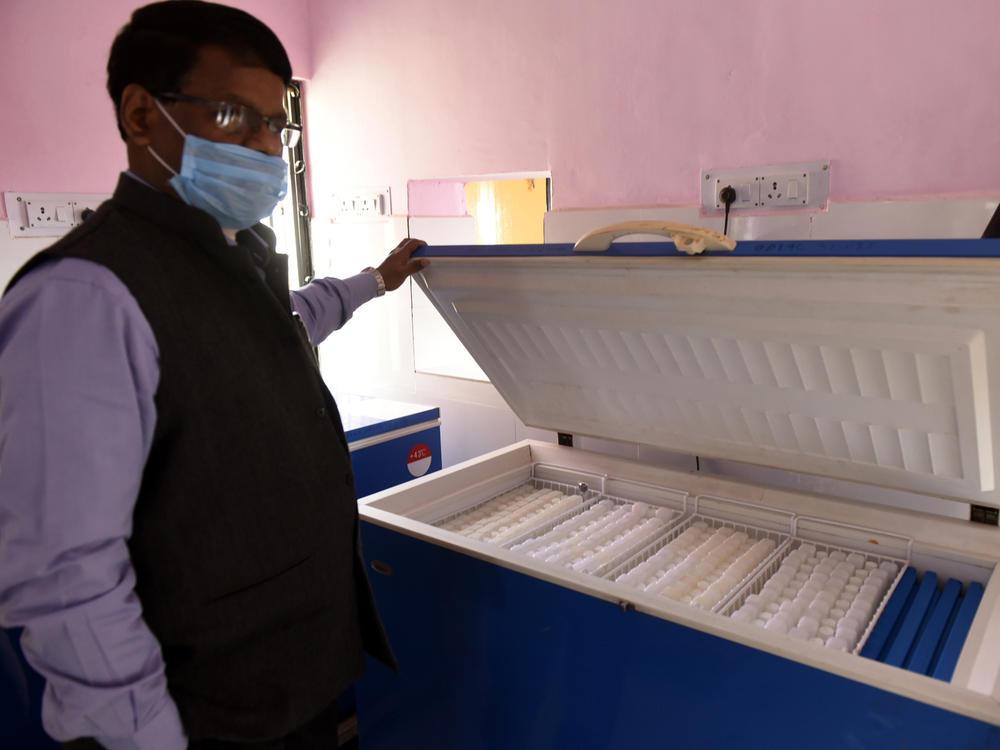Section Branding
Header Content
India Prepares For Massive Vaccine Drive, But Some Fear It's Moving Too Quickly
Primary Content
As India embarks this weekend on what may become the biggest national vaccination campaign in the world, some scientists have raised questions about one of the two vaccines the country of 1.4 billion people has authorized for emergency use against COVID-19.
More than 5 million vaccine vials arrived early Wednesday at hundreds of hospitals and clinics across India. Inoculations start Saturday. India aims to vaccinate 300 million people by July.
The shipments consist of two formulas: One developed by Oxford University and the pharmaceutical giant AstraZeneca, and another vaccine developed by an Indian company called Bharat Biotech — billed as India's first "indigenous" vaccine. Both vaccines are being manufactured inside India.
Officials say patients will not be able to choose which of the two vaccines they get.
However, some scientists have expressed concern that the one produced by Bharat Biotech is being deployed prematurely. It still has yet to clear phase three clinical trials, and efficacy data isn't expected until March. Activists also allege unethical practices at one of drug's trial sites.
"Our chief concern is the lack of efficacy data," says Malini Aisola, co-convenor of the All India Drug Action Network (AIDAN), a healthcare watchdog. "It is currently too early for there to be any data. However, the regulator has cleared it for emergency restricted use, in what is being called 'clinical trial mode.' We actually have no idea what this means."
When India's regulator announced the vaccine's approval on Jan. 3, it said it was aimed at offering more options, in addition to the AstraZeneca formula, given that a more infectious COVID strain had been discovered in the UK. But at a news conference, the Drugs Controller of India, V. G. Somani, refused to take questions.
Many scientists, public health experts and opposition politicians are calling for more transparency.
Bharat Biotech's founder & chairman, Krishna Ella, told a Jan. 4 news conference his company's vaccine is "200% safe."
"We are 200% transparent, 200% honest clinical trial! And we get a bashing from everybody," Ella told reporters, accusing them of "bashing" his company.
It's not the first time India's regulator has bypassed the last phase of clinical trials to approve a potentially life-saving medicine. It happened last spring with hydroxychloroquine, a drug President Trump touted without proof as a treatment for COVID-19.
But there's a difference between giving an experimental drug to someone who is already sick, and giving a vaccine to someone who is healthy, says public health activist Dinesh Thakur.
With vaccines, he says, there should be more oversight. In the case of the Bharat Biotech vaccine, "the approval process in India was a secret," Thakur says.
He suspects it may have something to do with a new initiative by Prime Minister Narendra Modi called "Aatmanirbhar Bharat," or self-reliant India. In addition to a vaccine developed by the big multinational company AstraZeneca, India may also have wanted to approve one that was developed in India.
"There seems to be some sense of nationalism. You know, we can also make a vaccine," Thakur says.
Making vaccines — or least, mass-producing them — is something India is actually famous for. It's the world's largest vaccine producer, nicknamed 'the pharmacy to the world.'
Copyright 2021 NPR. To see more, visit https://www.npr.org.

